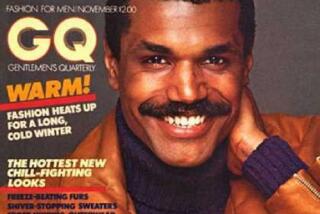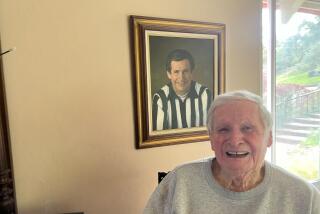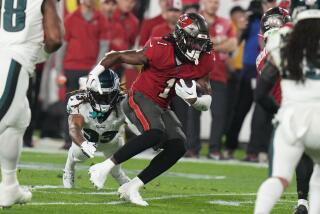Reggie White; 43; Former NFL Star Defensive End
- Share via
Reggie White, one of the NFL’s fiercest players on the field and one of the most devoted humanitarians off it, died Sunday in Cornelius, N.C., his wife said. He was 43.
The cause of death was not immediately known, but a family spokesman said White had suffered from a respiratory ailment for several years that affected his sleep. White died at Presbyterian Hospital, where he was taken after his wife called 911. An autopsy is planned.
White, a two-time NFL defensive player of the year and an ordained Baptist preacher, played a total of 15 years with the Philadelphia Eagles, Green Bay Packers and Carolina Panthers. The defensive end retired in 2000 as the league’s all-time sack leader with 198, a mark surpassed last season by Washington’s Bruce Smith.
The first marquee player of the NFL’s free-agent era, White was the focus of an intense recruiting battle involving several teams, among them Green Bay, the Washington Redskins, San Francisco 49ers, New York Giants and New York Jets. That led to a four-year, $17-million contract with the Packers, making him the league’s highest-paid defensive player at the time. The deal was huge in its day, although teams now spend similar sums on less spectacular players.
White was one of the plaintiffs in a lawsuit that led to the current system of free agency.
“He meant as much to us off the field as on it,” said Gene Upshaw, executive director of the NFL Players Assn. “He had his name on the lawsuit and he didn’t get one penny. That’s just the type of guy he was. His character, his integrity was everything any NFL player should aspire to be.”
White helped lead the Packers to consecutive Super Bowl appearances, including a win over New England in 1997, when he set a Super Bowl record with three sacks (tackles of the quarterback behind the line of scrimmage).
Packer Coach Mike Sherman put White’s legacy into context Sunday.
“The younger players don’t [generally] recognize the older players and what they accomplished, but there’s not a player in this league
“I don’t think there’ll ever be another player like Reggie White.... There’ll never be another player who put fear into offensive linemen like he did. I think he won some plays on fear alone. There weren’t many people who wanted to line up against Reggie White, even at the end of his career.”
In his free time, White concentrated on changing the world around him.
“Reggie White was a gentle warrior who will be remembered as one of the greatest defensive players in NFL history,” NFL Commissioner Paul Tagliabue said in a statement.
“Equally as impressive as his achievements on the field was the positive impact he made off the field and the way he served as a positive influence on so many young people.”
Former and current NFL players expressed shock that an incredibly strong competitor who apparently walked away from the game with his health intact would die so unexpectedly.
“When I saw it on the TV ticker, I thought it was a mistake,” retired NFL tackle Lincoln Kennedy, an NFL Network analyst, said from his Bay Area home. “I thought, ‘That can’t be right.’ I thought I’d missed something.... To the people in pro football, Reggie White was an icon.”
But Kennedy said he believes the abuse that players put their bodies through, especially massive linemen, might have been a contributing factor in shortening White’s life.
“You think about the things we go through, the stuff we put in our bodies just to stay on the field,” he said. “You just wonder about that. We as athletes were warriors. We’d do whatever it took. It’s very alarming to see someone so young pass away.”
White was elected to the Pro Bowl a record 13 consecutive years from 1986 to 1998; won defensive player of the year honors in 1987 and 1998; and was named a member of the league’s 75th anniversary team. He and fellow defensive lineman Jerome Brown were the heart of a ferocious Philadelphia “Gang Green Defense” that dominated opponents in the latter half of the 1980s. Brown, among the game’s best defensive tackles, died in a 1992 car accident at age 28.
During his eight seasons with the Eagles, White and his wife, Sara, spent many hours talking to inner-city children in Philadelphia about the dangers of drugs and alcohol and the importance of staying in school.
In 1991, the Whites used their Tennessee property to open a residence for unmarried pregnant women and new mothers. The home, called Hope Palace, was funded in part by the royalties that White received from his book, “The Reggie White Touch Football Playbook: Winning Plays, Rules and Safety Tips.” He often was asked how he reconciled the notion of holding strong Christian beliefs while playing such a brutal game.
“One of the things you’ve got to realize is that football is aggressive, not violent,” he told Inside Sports magazine in 1993. “Violence is what’s happening in our streets, where our kids are dying.”
Reginald Howard White was born Dec. 19, 1961, in Chattanooga, Tenn., to his unmarried parents, Charles White and Thelma Dodd Collier. The younger White’s childhood hero was a white preacher of the all-black Baptist church he attended.
“Reverend Ferguson was the greatest man of God I ever saw,” White told Sports Illustrated in 1989. “He had a way with kids and teaching. I always wanted to be a Christian, but I never knew how. He said understanding was the first thing I had to know.”
He told his mother when he was 12 that he planned to be both a minister and a football player, and began preaching in churches when he was 17. In high school, the youth who would grow to 6 feet 5 and 300 pounds lettered three times in basketball and once in track and was named to the high school All-America team.
White attended the University of Tennessee from 1980 to 1983, although sources differ as to whether he completed his bachelor’s degree in human services. He was the defensive line stalwart for the Volunteers and was a perennial all-conference selection and a finalist for the Lombardi Trophy, awarded to the nation’s top lineman.
He began his pro career with the Memphis Showboats of the United States Football League in 1984. When that league folded a year later, White joined the Eagles, who held his NFL rights.
When Buddy Ryan took over as coach of the Eagles in 1986, White’s career flourished. Despite facing double- and triple-teaming blockers on nearly every down, he registered 18 sacks in 16 games in his first season under Ryan.
White was named the most valuable player of the Pro Bowl after that season, collecting four sacks in that game. The following season, he had a league-leading 21 sacks and almost certainly would have broken the all-time record -- then 22, held by the Jets’ Mark Gastineau -- had the season not been shortened by a players’ strike.
White spent eight years in Philadelphia and had a team record 124 sacks from 1985 to 1992. He then went to Green Bay, where he retired following the 1998 season. He returned to the NFL in 2000 for a final year with the Panthers.
Although White had hoped to launch a TV career after retiring from the Packers, his options dwindled after he denounced homosexuality on religious grounds and used ethnic stereotypes in a speech to the Wisconsin Legislature in 1998. He later apologized for the comments.
In addition to his wife, he is survived by two teenage children, Jeremy and Jecolia.
Funeral services were pending.
More to Read
Go beyond the scoreboard
Get the latest on L.A.'s teams in the daily Sports Report newsletter.
You may occasionally receive promotional content from the Los Angeles Times.











